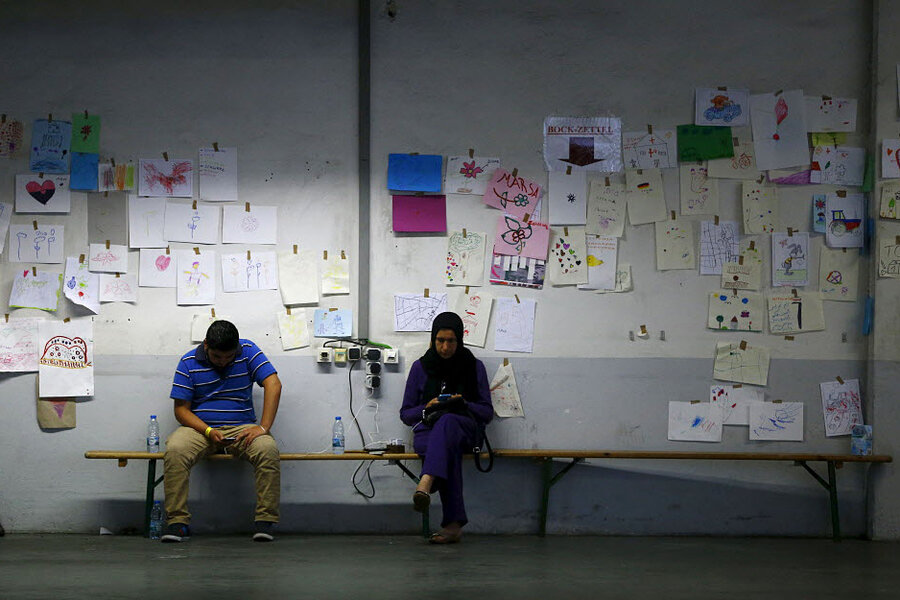Germany moves to clamp down on Facebook racism
Loading...
As Europe’s refugee crisis continues to intensify, German officials are hoping to stem a growing tide of racism and hate speech directed against the migrants online.
On Friday, German chancellor Angela Merkel said that social media sites such as Facebook bear some of the responsibility for the spread of racist and xenophobic posts.
“When people stir up sedition on social networks using their real name, it's not only the state that has to act, but also Facebook as a company should do something against these slogans,” Ms. Merkel said in an interview with the newspaper Rheinische Post (Translation via Reuters.)
Now, the German government is trying to engage social media sites directly. Heiko Maas, the German justice minister, sent a letter last month to Facebook’s European office in Dublin arguing that the site was not doing enough to prevent racist comments posted online. He also requested a meeting with Facebook officials, set to take place in Berlin on Monday, according to Mr. Maas’ Twitter page:
Many users were receiving notifications that comments they reported as abusive did not violate Facebook’s community standards, Maas wrote, according to the German broadcaster Deutsche Welle. Facebook did not respond to requests for comment from the Monitor about how it moderates posts.
Noting that Facebook’s community standards were often strictly enforced for images of nudity, Maas called the company's response a “farce,” saying the site had a legal obligation to delete posts that incite hatred, a criminal offense in Germany.
His requests to delete offensive posts did not violate freedom of speech, Maas wrote, because “the Internet is not a lawless space where racist abuse and illegal posts can be allowed to flourish."
Racism and hate speech often flourish online because of the physical distance – and relative anonymity – provided by many websites and social platforms, researchers say.
“There’s something about typing something to someone, rather than saying it to their face, that creates a certain kind of hate speech,” says Jessie Daniels, a professor at the City University of New York's School of Public Health who has studied racism and white supremacist movements online.
Differing views of what constitutes free speech internationally may also play a role in Germany’s efforts to limit hate speech online.
In Germany, professor Daniels says, debates about free speech intermingle with concern about the fate of migrants coming to the nation’s borders, often fleeing violent conflicts in their home countries. By contrast, in the US, she notes, violent or threatening speech is often seen as protected by the First Amendment.
But what is most concerning in both regions, she says, is that racist and xenophobic posts can quickly turn into action.
“Social media makes racist speech much more available, much more accessible,” she adds, referencing Dylann Roof, the white South Carolina man accused of killing nine people at a church in Charleston who were black. Mr. Roof reportedly scoured white supremacist websites before committing the murders.
In the interview with Rheinische Post, Merkel voiced similar concerns, saying Facebook has some policies in place to prevent hate speech, but is not doing enough to enforce them.
But her own stances on immigration have also been criticized. Some Germans view her as insufficiently concerned about the large numbers of migrants – particularly from Syria – currently seeking shelter in Germany. Over the past several days, hashtags expressing that sentiment, including #Merkelschweight (which translates as “Merkel is silent,”) and #Merkelsagwas (“Merkel, say something”) have been trending on Twitter.
In 2010, she faced a backlash after saying that a multicultural society, with different immigrant groups who “live side-by-side and enjoy each other,” had “utterly failed” in Germany. Other European leaders, including then-French President Nicolas Sarkozy and British Prime Minister David Cameron, also made similar statements at the time.
In the US, responses to racism and xenophobia are also flourishing online, Daniels says. She singles out the Black Lives Matter movement, founded to raise awareness about the killings of unarmed young black people by police. But while anti-racist activism has gained increasing prominence through social media, it’s not the whole story.
“That shift from the one to the many is significant, but it’s not the tools that are driving the change, it’s the people, it’s the social movement and that’s what makes me hopeful,” she says.
Will a crusade against Facebook’s commenting policy also curb xenophobia against refugees in Europe? It’s difficult to tell, but Merkel appears to have taken up the cause.
Perhaps in response to the #Merkelschweight label, she is now speaking out more freely against xenophobic attacks – including a number of arson attempts at refugee centers, the Washington Post reports.
“It is repulsive how far-right extremists and neo-Nazis are trying to herald dumb messages of hate,” Merkel said at a refugee center in the eastern city of Heidenau, according to the Post. “Germany is a country which respects the dignity of every single individual. This is what it says in our constitution, and this applies to everyone staying in our country.”





